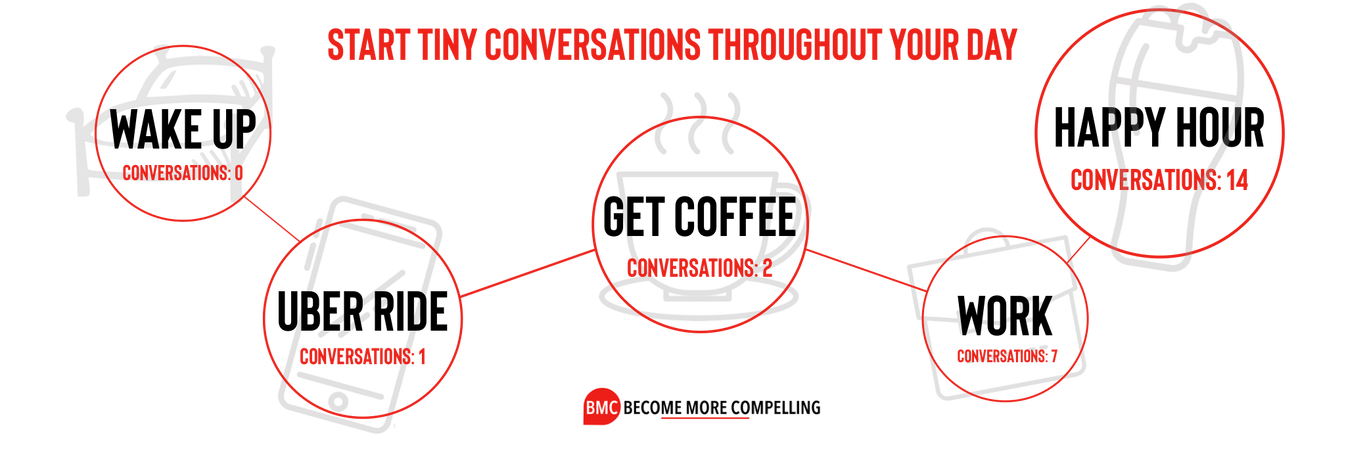Conversation skills are important: these skills can be the difference between having great friends, connections, and experiences and...not.
In your business or career, good conversation skills can help you land a new client, or lay the groundwork for future promotions.
In your social life, good conversation skills can help you get a date, or build a relationship with a potential lifelong friend.
Today we're going to cover how to improve conversation skills. You can start using these 8 powerful tips today.
In This Article...
- How to become more approachable. (Works IRL and on Zoom meetings!)
- How to make better eye contact.
- The Iceberg Effect: How to develop a wide range of interests so you'll have more to talk about during conversations.
- Why dialing up your energy by 10% is crucial for better conversations.
- How to use the Spokes Method to always have something to say in conversations.
- What to do if you interrupt during conversations.
- How to build rapport quickly by listening for "same here!" moments.
Let's dive in: Watch the video below, or read on...your call!
(These first two tips will help your conversation skills before you even open your mouth!)
1. Be Approachable So That You Don't Scare People Away
Have people ever asked you...
"Are you feeling okay?"
"Are you mad/tired?"
And you scream in the shower later...
"JEEZ, this is just how my face IS!"
When it comes to having a good social interaction, appearing approachable is good. And if we don't seem approachable, then our interactions won't go as smoothly as they could.
Here's how to seem 10x more approachable and reduce any accidental resting bitch face:
Have a slight smile as you go to enter a conversation. (Science-y stuff: An authentic smile uses the zygomatic major muscle group raising the corners of the mouth. It also uses the orbicularis oculi raising the cheeks and producing crow's feet around the eyes).
Use the eyebrow flash. This hyper-quick up-and-down movement of the eyebrows sends a "friend signal".
Studies have shown that even faking a smile at first can change your own internal state to a more positive one by lowering heart rate and stress.
Action step: Combine that wonderful smile of yours with that oh-so-subtle eyebrow flash to make people think: "Damn. This person must be awesome."
2. A Little Eye Contact Goes A Long Way
Years ago, I had a buddy named Shawn.
Shawn was an Olympic gold medalist in eye-contact.
I remember riding in the backseat of his car and noticing he made a point to make eye contact with me through the rear view mirror as he spoke to me.
The result? I always felt like Shawn was present in our conversations.
Eye contact is important.
Eye contact is a hardwired way to connect with each other as humans. Infants as young as two days old prefer looking at faces that gaze back at them.
Most of us don't make as much eye contact as we should, especially while speaking because eye contact makes us self conscious as adults.
To level up your conversation skills in a subtly powerful way. Try this:
Action step: The next time you are speaking in conversation, make a point to make eye contact while speaking. Wait for the other person to look away. Then, look slightly away until you notice them looking back at you. Rinse and repeat.
This is what my friend Shawn did. It works.
(It won't be easy the first dozen times, but that's okay. The more you practice eye contact, the more you'll stand out to people.)
Common eye contact question: "What if [they don't look away/they don't blink/they think I'm a psycho]?!
Answer: Doubtful this will happen. Test it in the real world before thinking of reasons why it won't work.
3. The Iceberg Effect: Develop A Wide Range Of Interests So That You Can Connect With More People
Let's talk about icebergs.
Icebergs have a tip that sits above water, and much more that hides below the surface.
Iceberg tip: People who seem to seamlessly slide into any conversation and offer an opinion or comment?
Below the surface: They likely listen to a wide variety of audiobooks, podcasts, and read a few interesting articles per day.
Real talk.
If you spend 99% of your free time learning about Power Rangers, you won't be very balanced when it comes to interests. You'll be at a disadvantage during those pesky conversation outside of Comic-Con.
What we want is interest diversification.
Off the top of my head, here are 10 interests that I could speak to right now:
- Baseball
- WWI History
- East Coast Swing Dancing
- Cooking Steak
- Podcasting
- Video production
- Writing
- Icelandic geology
- Theodore Roosevelt's early years
I know, I know, you're super impressed. Try to not be blinded by my genius.
Here's the deal...
You don't have to know a TON about any given topic, just have a well-rounded set of interests. This helps you relate to a wide variety of people.
(This is also the secret sauce that makes people seem "interesting")
Action step: Learn about one new thing today. (Use podcasts, audiobooks, Youtube, Wikipedia, some graffiti under a bridge somewhere)
Note: If you don't know much about the current topic, be curious! Let the other person teach you something new!
My podcast guest Paul Sanders and I talked about developing a wide range of interests on this recent podcast episode:
4. Dial-Up Your Energy By 10%
What do Tom Cruise, Will Smith, Rickey Gervais have in common when you watch them on late night tv?
They're all high energy.
Something I see consistently when my private coaching clients are learning how to improve conversation skills is defaulting to low energy.
I think of it as "safety energy". They don't want to make a big splash or be too loud so they default to a toned down version of themselves.
Now, you do NOT have to be bouncing off the walls like Jim Carey in The Mask, but dialing up your natural energy just 10% can have a great effect on conversations.
People typically mirror whatever vibe you put out into the world.
Think about it. If you roll up to the group and tell them about how you had to put your dog to sleep, 99.9% of people are going to follow your lead and energy level.
The same is true for higher energy levels as well.
If you can show enthusiasm for the topic/location/party/event, then that energy becomes infectious to others.
Action step: In the next conversation you're in, test dialing up your energy by 10%.
5. How To Improve Conversation Skills By Thinking "Around The Topic" For Things You Can Talk About
I've written about the Spokes Method before, but it's so powerful that I can't NOT include it.
The Spokes Method will help you connect with anyone on virtually any topic.
Even if you don’t know a lot about the current topic.
No more grasping for small talk topics! Yay!
Imagine a bike wheel.
In the middle, you have a hub, and radiating out from the hub are several spokes.
Now, imagine the hub as the conversational topic.
The spokes are different, related topics that can be introduced.
Example: Your conversational partner brings up painting, something you don't know much about.
Should you just stonewall them and say "I don't want to talk about painting."
Should you just sit there and be quiet?
NO!
Dale Carnegie, author of How To Win Friends And Influence People once spent an entire dinner party talking (and mostly listening) about botany.
His conversational partner told the host that Dale was the best conversationalist he'd ever met.
Lesson: You don't have to carry the conversation.
Watch this video for more examples of The Spokes Method:
Do this instead: Use the Spokes Method to "think around the topic" and mention other things that are related to painting:
- "How do you choose what to paint?"
- "What kind of painting do you do?
- "Who is your favorite artist?"
You can go deeper into who the person is by bringing up:
- "You must be very creative, how did you get into painting?"
- "As a kid, did you do anything else artistic?"
- "If you could paint anything in the world, what would it be?"
You can even play the role of the beginner with a question like:
- "I don't know much about painting, what's your favorite thing about it?"
(Note how Spokes can be used to form questions and observations, it's important to balance both so that you don't fall into interview mode)
Using Spokes, you'll be able to talk with anyone about anything.
Spokes is a win-win.
A win for you because you get to have a great, engaging conversation.
A win for them because other people love talking about themselves and will leave the conversation thinking that you are awesome.
Action step: Think of the last conversation you had. Now think of any topics from that conversation. Try to think of 3 related topics you could have brought up.
6. Try Not To Interrupt (But If You Slip Up, Do This)
No one likes to be interrupted. But look, it's bound to happen from time to time.
Maybe your new friend brings up something that you know a lot about, and you interject.
I know your interruption was coming from a great place.
Here's what you can say to get back on track and show the other person that you were listening, not just waiting for your turn to speak.
"Before I interrupted you, you were saying XYZ?"
This phrase is gold. It acknowledges that you interrupted, and it demonstrates that you were listening. (So well that you can provide them a jumping off point to get back to what they were saying.)
If you are the one who gets interrupted, it's actually a good thing. Let them finish their thought and then say:
"Going back to what I was saying about XYZ..."
This is subtle, you're not calling them out, you're just doing a little conversational nudge. If they get the hint, great! If not, rinse and repeat.
7. Keep an Ear Out For "Same Here" Moments
We all know that people typically like people who are like them.
Think about the last time you found out someone else was into the same hobby or interest that you are.
You may have felt like an old west miner who struck gold.
People LOVE discovering they have something in common with others.
When they do, it communicates that they belong to the same tribe.
Sometimes, those connections are obvious (same sports team, same alma mater or same conference).
Sometimes, they’re teased out through conversation.
When you discover that you both are into that same obscure TV show, watch their face light up when you tell them.
When those "Same here!" pop up, don't let them pass like two ships in the night. Call them out!
The more shared connections you have with someone, the more likely you’ll hit it off.
8. The Most Important Part Of Improving Your Conversation Skills: Daily Practice
Do you think LeBron James got to be world-class by NOT training?
Of course not. He training. Every athlete does. (Even your fit uncle who does triathlons.)
Practice is crucial when you're trying to improve any skill. When it comes to conversation skills, practice will take you further than any article (including this one) ever could.
The best way to practice is to put yourself in a position to have many conversations.
This may mean you schedule something social in your calendar every week.
What I recommend to my clients and readers is something called Conversational Muscle Memory.
Simply put: Start tiny, low stakes conversations throughout your day.

These conversations add up over the day and week. Every conversation is an opportunity to practice and improve. With these 8 tips you'll be well on your way to having better conversations.
Summary: How to improve conversation skills exercises:
- Look approachable by giving them the ole smile and eyebrow flash.
- Make eye contact, especially when speaking.
- Develop a wide range of interests. (via podcasts, articles, etc.)
- Dial up your energy by 10%. Note the difference in the people you talk to.
- Use The Spokes Method to listen "around the topic" for things you can talk about.
- Try Not To Interrupt (But If You do, use "Before I interrupted you, you were saying XYZ?")
- Keep an ear out for "Same Here" moments and call them out!
- Practice with small low-stakes conversations throughout your day.
4 ways I can help you level up your communication skills:
1. Private Coaching: I’m the secret weapon top Performers at Google, Netflix, and the US Army trust for people skills coaching. Imagine what I can do for you.
2. Social Accelerator: Social Accelerator is my proven self-paced + group coaching system for turning social awkwardness into confidence, overthinking into action, and hesitation into meaningful connections.
3. My group convos audio guide. Join over 5,000 overthinkers who have supercharged their group conversation skills using tested strategies in my 56-minute audio training.
4. My bestselling book Confidence-Maxxing. What I teach in this book comes from lessons that took me over 20 years and 100,000 conversations to learn. If you've ever felt like people skills are something you should've figured out by now but haven't, I wrote this for you.

I'm Jeff Callahan
I make it nearly impossible for overthinkers to fail at improving their people skills. (I've helped hundreds of people over the last 10 years)
Want to never run out of things to say in conversation again so you connect with more people and make new friends?
Want to speak up more in important meetings at work so you get promoted faster and have an awesome career?
Want to develop unshakeable social confidence and competence so you can walk into any room and feel like you belong there?
As your coach, I'll help you move forward faster.



















